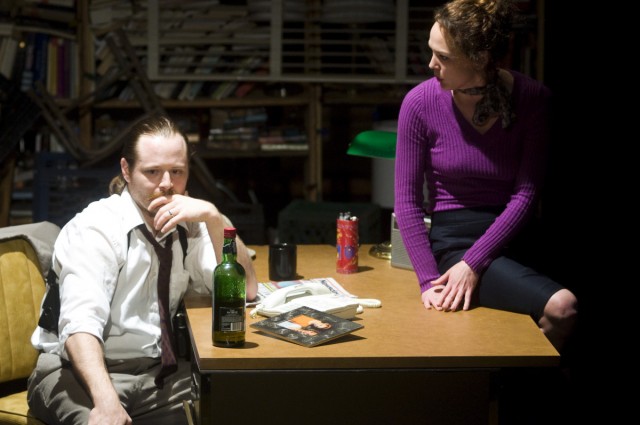
Detective Lang (William Apps) and Miss Hollis (Sarah Lemp) get caught up in a dangerous conspiracy in THE BAD AND THE BETTER (photo by Monica Simoes)
The Peter Jay Sharp Theater
416 West 42nd St.
Through July 21, $49.95
www.thebadandthebetter.com
Last summer the Amoralists squeezed twenty audience members into a small, makeshift bedroom in the Gershwin Hotel for a double feature of original plays by Adam Rapp (Animals and Plants) and company associate artistic director and cofounder Derek Ahonen (Pink Knees on Pale Skin). This year the innovative theater group is squeezing no fewer than 26 actors playing 33 characters onto the stage in the intimate 128-seat Peter Jay Sharp Theater for Ahonen’s delightfully gripping detective noir The Bad and the Better. David Nash stars as Venus, an earnest undercover cop posing as a playwright who embeds himself with a radical New York City anarchist group to supposedly study them for the sequel to his previous work, The Sad Singers on Stanton Street — a sly reference to Ahonen’s own downtown hit, The Pied Pipers of the Lower East Side. Led by twins Justice (James Kautz) and Charity (Selene Beretta), the anarchists are causing some minor mayhem, but bigger plans await. Meanwhile, Venus’s brother, hero cop Ricky Lang (William Apps), has been exiled to a far-off part of Long Island with a secretary (Sarah Lemp) who has the hots for him, but he soon becomes suspicious when people in his usually calm district start killing themselves. And somewhere in the middle of all this, slimy developer Richard Zorn (Clyde Baldo) is manipulating candidate Eugene Moretti (David Lanson) into highlighting the war on terror in an important upcoming election. The multiple story lines weave in and out of one another before coming together for an explosive climax, all expertly directed by Obie winner Daniel Aukin, who keeps the continuous stream of characters moving around Alfred Schatz’s set in clever ways, as if imaginary borders exist as one scene morphs into the next. The pulpy play takes on such themes as loyalty, honesty, violence, corruption, courage, betrayal, and, most of all, family, with a liberal dose of humor and even a few tugs at the heartstrings. “It’ll really just be a story about love but it’ll be somewhat disguised as a cautionary tale about the hypocrisies of extreme principals,” Venus says to the radical anarchists at one point in a self-referential explanation that doubles for Ahonen talking about The Bad and the Better itself, an engaging production that once again shows off the many talents of the somewhat radical and anarchic Amoralists.